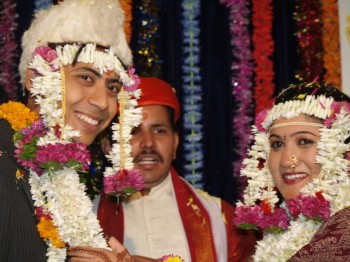04/26/2014
The Indian Wedding for Dummies - 7.In a nutshell
08:00 Posted in Incredible India!, Why in India... | Permalink | Comments (0) | Tags: india, marriage, wedding, arranged marriage, forced marriage, love marriage, rites, ceremonies, rituals, divorce, sheet, mehndi, henna, baraat, sex, incompatibility, contract, classifieds, matrimonials, matchmaker, nayan, astrologers, horoscope, marry a tree, marry a pot, auspicious, date, joint family, kama sutra | ![]() Facebook | |
Facebook | |
04/24/2014
The Indian Wedding for Dummies - 6. When things go wrong
The "Indian wedding" (I should say the Hindu wedding to be exact) has made the subject of numerous books, movies, visits to India. In short it’s an institution. I will try here to understand something to it!
With hardly 1 per cent of divorces, do Indians have the “keys” to successful marriages? Could it be arranged marriages?
To finish with the topic of marriage, the divorce! Yes yes!
Indeed, the figures are ridiculously low: 1.1% (source)
Firstly it is only since 1955 that divorce for Hindus is legal in India – which is 86 years after Christians, which was even 15 years before the legislation restored divorce in France in 1884! (In India, the divorce rules depend on the religion and there even was even a law, in 1969, specially for Indians who married a non-Indian.)
Secondly divorcing in India is not an easy task. (Hindu) spouses may divorce by mutual consent (for very specific reasons, such as adultery, cruelty, desertion for two years, religious conversion, mental disorder, venereal disease and leprosy) and only after living separated for one year. In addition, there is a mandatory six-month period of reflection after the case is filed. At the end of which the judge must estimate that the spouses have made all what was in their power to solve their problems (source).
Thirdly, one should not believe that all problems are solved once the divorce is granted: there is no regime of community property in India, everything returns to its owner (often the man).
And as for the pension, already quite low in general, the woman must prove the income of her husband and the tax authorities estimate that only 3% of the population declare their income! (source)
Quite a few women must regret, as some point of time, not having born in Kerala (in the Nairs, Ezhavas and Warriers communities) or in a tribe of Meghalaya: they are matrilineal societies where descent and inheritance is by women – in Meghalaya, it is the youngest daughter who inherits property and the burden of caring for her aging parents and unmarried siblings! (source 1; source 2)
Beyond (very frequent) violence and adultery, “incompatibility” is more and more frequently the cause of separation. And that generally refers to a not-getting-along with the in-laws or the spouses’ egos that seem to take more and more space as the West’s influence grows (source) and/or some sexual incompatibility.
I can almost only hear stories of marriages without sex around me (in India), and most often the man is the culprit, forcing my girl friends to do a lot of other activities to get rid of their frustration!
Already that sex with someone you love needs to be worked on, I can only imagine what it is like with someone you are not particularly attracted to... Especially when it's a taboo, so there is no way you can share it with your girl friends and get reassured, because somehow, women always tend to believe that everything is their fault... While sometimes it is not!
I am quite convinced that a lot of Indian men cheat on their wives (I could take the example of my ex-boss, my landlord, his father-in-law, my sales representatives) and who would they do it with if not with married women?? Well not so many single girls would allow it… It is like if there was a natural rebalancing of life: you get a sexless marriage but you can get sex outside without commitment and it is good for physical and mental health!!
A funny thing is that Westerners associate India with Kama Sutra and think of the country as a sex paradise! While in fact it is nothing like that. The Kama Sutra was written 1,500 years ago and since then the Muslims and then the British invaded the place and Indians became a little ass-tight on the subject... * The 10 most popular jobs in 2008 did not exist in 2004. Source: http://www.youtube.com/watch?v=x-9FaJPhFxQ
08:00 Posted in Incredible India!, Why in India... | Permalink | Comments (0) | Tags: india, marriage, wedding, arranged marriage, forced marriage, love marriage, rites, ceremonies, rituals, divorce, sheet, mehndi, henna, baraat, sex, incompatibility, contract, classifieds, matrimonials, matchmaker, nayan, astrologers, horoscope, marry a tree, marry a pot, auspicious, date, joint family, kama sutra | ![]() Facebook | |
Facebook | |
04/22/2014
The Indian wedding for Dummies - 5. Life with the in-laws
The "Indian wedding" (I should say the Hindu wedding to be exact) has made the subject of numerous books, movies, visits to India. In short it’s an institution. I will try here to understand something to it!
Once all the ceremonies of the marriage are completed, the bride goes up to the threshold of her house (where traditionally the wedding takes place) with relatives and throws a handful of rice and coins over her head, as a symbolizing of “paying back” for what her parents have done for her as well as her best wishes for prosperity to her former household. Similarly, the car in which she sits with her husband is pushed by the family and covered with money to keep away the evil eye.
After that, she fully becomes a member of her in-law family: she goes to live with them, she is invited to call the parents mum and dad (which is simply inconceivable for Europeans). In some communities, she even changes her first name for one selected by her new family, sometimes even for the female version of the husband’s name! Like that you make sure there is a clean slate of the past... Though I must say, there is often much more to look forward than backward as in the villages (where more than 60% of the population live), girls are married on average at 16.
Life in the joint families (extended families where several generations live under the same roof and especially (this is the very principle) share food, worship and property)) is not always easy. Take my friend for instance: she married into a very rich family and yet was not allowed to go out unaccompanied after sunset...
I must admit that the joint families system is very practical, more economical, with in-house babysitters and papysitters etc, but it doesn’t really encourage personal development...
Economic growth (and for example the creation of new jobs* with children not embracing their father’s career and having to be geographically mobile, or the women's access to education and employment) is accompanied by socio-cultural changes, including the decline of the joint families system and the rise of nuclear families (63% in urban areas) and 59% (in rural areas) (source).
In the joint family, the daughter-in-law has to deal with the mother-in-law, saas, which is an icon in India; it’s recommended not to read too much on the topic because it's just super scary! Half of the soaps feature the tyranny exerted on her daughter-in-law, a kind of revenge for what she herself suffered from her own mother-in-law and all the men of the family! (source)
Anyway tyranny happens only when they live! If the parents cannot afford the dowry they committed to, things can heat up pretty bad... In 2012, more than 8,000 women were murdered for this reason; a popular technique is throwing acid or an accidental fire in the kitchen.
And to top it all, even if the daughter-in-law and mother-in-law share a good relationship, the first will have to deal with the mother-son relationship, which, in India, is of the same ilk as with Jewish or Italian mothers. I once read that “since Indian women cannot marry the perfect man, they make him”. Good luck to keep the kid on Earth! And what expectations, what pressure he has to deal with!
08:04 Posted in Incredible India!, Why in India... | Permalink | Comments (0) | Tags: india, marriage, wedding, arranged marriage, forced marriage, love marriage, rites, ceremonies, rituals, divorce, sheet, mehndi, henna, baraat, sex, incompatibility, contract, classifieds, matrimonials, matchmaker, nayan, astrologers, horoscope, marry a tree, marry a pot, auspicious, date, joint family, kama sutra | ![]() Facebook | |
Facebook | |















